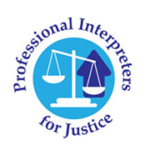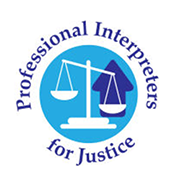Professional Interpreters for Justice (PI4J) is a working group comprising eleven organisations representing several thousand public service Spoken and British Sign Language Interpreters and Translators. Our aim is to work with any incoming government to ensure access to justice and the public’s safety through the availability and quality of regulated, qualified and appropriately experienced interpreters and translators working in the UK courts, police, the NHS, and public services. In order to ensure this, it is vital for equitable rights and better pay and working conditions of interpreters and translators to be achieved.
Professional interpreters attending assignments in person and, where needed, professional translators are essential to ensure justice and human rights are upheld for non-English speakers and deaf people in public service contexts. We believe having a human interpreter present in all high stakes situations is essential to support victims of crime, witnesses (including foreign expert witnesses), patients and the wider public. This should be considered as a basic human right.
The ‘Working Together’ White Paper – PI4J’s 10 Recommendations for Translation &
Interpreting in the Public Sector alongside the Association of Translation Companies
Published in October 2023, the ‘Working Together’ White Paper highlights the fragmentation, vulnerability, and complexity of the language services supply chain, which involves public sector commissioning and buying organisations, language service companies, and freelance interpreters and translators. It also emphasises the importance of language services for ensuring fair and equitable treatment of speakers of more than 300 different languages in the UK. The White Paper warns that unless decisive action is taken to support the sustainable delivery of language services, the quality and safety of public services will be compromised.
The paper proposes ten recommendations for public sector commissioning and buying organisations to implement at policy, framework and contract levels. These include working together with language stakeholders, indexing the cost of contracts and linking to inflation, building in fair and equitable interpreter and translator fees, increasing transparency on rates
and cancellation policies, promoting and prioritising the use of qualified professionals, building pathways and supporting career progressions, and supporting small businesses’ access to public sector work. The paper calls for a joint effort to safeguard the vital work of interpreters and translators and to create a pipeline for future professionals.
Current Challenges with Language Services Contracts and Frameworks
Public services are seeking to reduce costs by outsourcing language services. Progressive degrading of the pay and terms and conditions of public service interpreters and translators has profoundly compromised the number of appropriately qualified professionals willing and available to do this vital work and has eroded the quality of services provided to the public, the police, the NHS and courts and tribunal services. The majority of such regulated professionals are now refusing to work for the fees, terms and conditions offered in the main framework contracts.
As a result, there are well-documented cases of costly delays, collapsed trials and miscarriages of justice within the UK Criminal Justice System (CJS). Within the health and social care system there is evidence of negative outcomes for people, health and well-being. This inefficient and wasteful use of taxpayers’ money severely erodes public faith in public services through damaging media coverage.
We call on any incoming government to commit to:
- Implement the recommendations of the “Working Together” white paper to ensure fair and equitable access to public services to all in the UK
- Promote the use of regulated, qualified and experienced interpreters and translators: Only appropriately regulated, qualified and experienced Public Service Interpreters and Translators should be used in vital public service contexts which must be stipulated and enforced within all Framework Agreements and in any future arrangements
- Support independent registers and regulators: Regulation and the maintenance of registers should not be in the hands of ministers, the police, public services, or private providers. Registration with NRPSI (the National Register of Public Service Interpreters), NRCPD (the National Registers of Communication Professionals working with Deaf and Deafblind People) and/or CCC in Wales (Cymdeithas Cyfieithwyr Cymru (Association of Welsh Translators and Interpreters)), should be mandatory
- Call for a mandatory independent regulator and register for agencies to be accountable in their business practices, and where complaints can be heard and actioned
- Ensure fair pay and terms and conditions for interpreters and translators: Interpreters and translators need to receive index-linked fees for sustainable minimum booked durations, with correct compensation for preparation, time and travel expenses, accommodation, subsistence costs and cancellation fees, which should recompense interpreters in full. Such good practice should prevent perverse incentives and the abuse of public funding provision which works against both source clients, as well as interpreters and translators
- The right to face-to-face interpreting provided by a human being: The support, comprehension and the vital understanding of context brought by a human interpreter cannot be replaced by remote interpreting or AI where context and cultural nuances are vital. The right to an in-person interpreter must be protected
- Timely access to information and briefing for interpreters: So that registered interpreters can fulfil their role in providing clear and accurate interpretation, they need to have the right to be informed and briefed on cases prior to assignments (applicable to remote interpreting as well as face-to-face), which is especially pertinent in the case of BSL which requires enough information for the interpreter to create accurate and precise visual representations in a three dimensional form
- Consult with professional interpreters and translators prior to adoption of new technology: AI can bring benefits in many fields and its potential to support effective communication should be thoughtfully explored. AI’s performance in translation currently falls short of the quality and consistency delivered by an experienced human translator. Though currently less advanced, the use of AI interpreting in high stakes settings (e.g. legal proceedings and medical situations) is clearly fraught with risk. Remote (online) interpreting and the use of tour guide systems in some courts were introduced without consultation and trialling the system, yet these modes of working impact interpreters’ health and welfare. Protection of the general public by the exclusive use of registered and regulated interpreters and translators must remain the key priority
- Provide free, high quality professional supervision for public service interpreters and translators who have had to work with challenging, explicit and potentially emotionally damaging content to ensure their mental well-being. Interpreters, in courts or police stations, can be involved in working with the most traumatic and disturbing content. As interpreters and translators, they do not have the option to stop listening or to look away. They must deliver all information fully, completely and explicitly. This has a lasting effect on interpreters. The police, HMCTS and the NHS should share some responsibility for funding and providing services to support the well-being of interpreters and translators.
Professional Interpreters for Justice (PI4J)
The voluntary national register and regulator of spoken language interpreters
National Register of Public Service Interpreters Ltd (NRPSI) – chairman@nrpsi.co.uk
Cymdeithas Cyfieithwyr Cymru (Association of Welsh Translators and Interpreters) – swyddfa@cyfieithwyr.cymru
Royal Charter bodies
Chartered Institute of Linguistics (CIOL) – ceo@ciol.org.uk
Professional Associations and Societies
Association of Interpreters and Translators (AIT) – chairman@ait-professionals.com
Association of Police and Court Interpreters (APCI) – chairman@apciinterpreters.org.uk
Institute of Translation and Interpreting (ITI) – ceo@iti.org.uk
Society of Official Metropolitan Interpreters UK Ltd (SOMI) – board@somiukltd.com
Association of Sign Language interpreters and translators (ASLI) – office@asli.org.uk
Trade Unions
National Union of Professional Interpreters and Translators, part of Unite the Union
(NUPIT) – nupit@unitetheunion.org
National Union of British Sign Language Interpreters (NUBSLI), part of Unite the
Union – communications@nubsli.com
Collective
BSL Legal – hello@bsllegal.org

